14 Best Foods For Your Skin, According to Dietitians
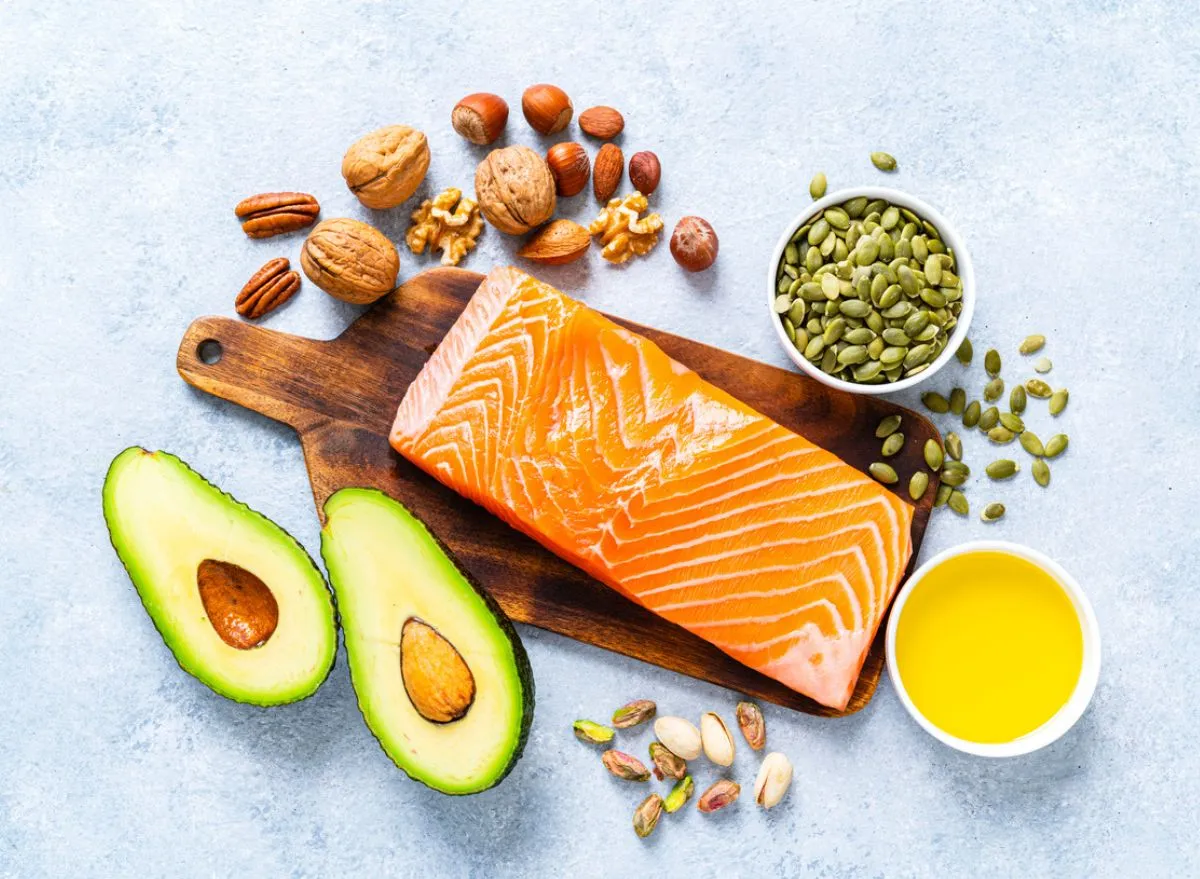
The appearance and health of your skin can be impacted by your diet. For example, research notes a possible link between dairy and acne in some, and water intake can affect skin hydration. This only begins to describe the relationship between your food and drink choices and skin. If you are looking to improve the appearance of your skin, look no further than your fridge and pantry.
It likely comes as no surprise that less processed food is generally better for your body. Minimally processed food is less likely to have added salt, sugar, preservatives, and additives that could impact your skin and overall health. When improving your diet for skin health, focus on foods in their natural state, or close to. Fruits, veggies, lean protein, nuts, seeds, and some oils are examples of food with few to no added ingredients. If the only ingredient is the food itself (e.g. the only ingredient in a kiwi is kiwi), you are on your way to improved food quality that could boost the health and appearance of your skin!
In addition to eating certain foods and avoiding others, make sure you are drinking enough water. There is no one hydration goal that works for everyone; however, one study noted improved skin hydration levels in a group that consumed 5.2 liters of water a day compared to the group that consumed 3.2 liters. Limiting your skin’s exposure to the sun and wearing sunscreen daily are other methods to protect your skin’s health. Read on to learn the 14 best foods for your skin, and for more, don’t miss The Best Supplements That Reverse Skin Aging, Say Dietitians.
Salmon
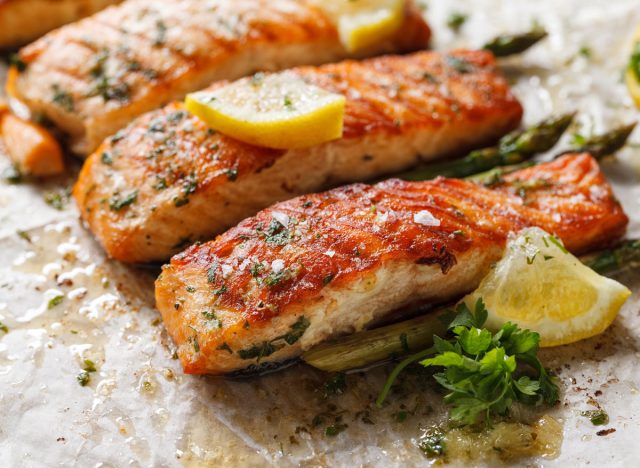
This fish is a great source of omega-3 fat, a nutrient important to skin health. This nutrient can also reduce inflammation in the body, potentially reducing the incidence of acne, too. Shopping for seafood can feel intimidating for some. When it comes to salmon, I recommend Chilean salmon because of its notable omega-3 content. It is also low in mercury, making it a safe option for your whole family- including pregnant women and children. Enjoy grilled, baked, or pan-cooked salmon over a salad full of vitamin C-rich produce and topped with olive oil for even more skin benefits.
Walnuts
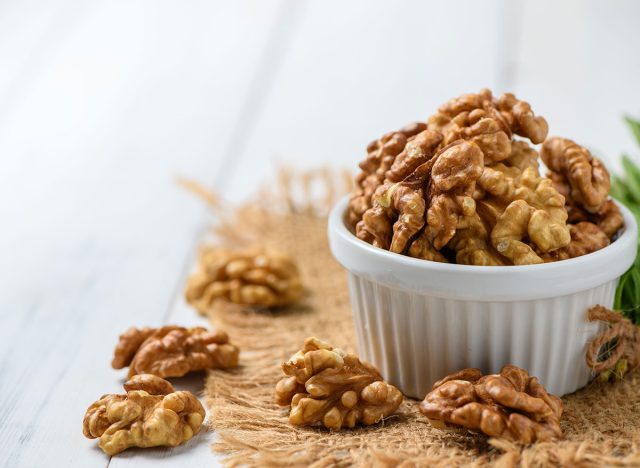
Similar to fish, walnuts are also a source of omega-3 fatty acids. Not only can this essential fat improve your skin, but walnuts are also a source of zinc, another skin-promoting nutrient. This mineral is involved in skin barrier function and wound healing and also serves inflammatory and antimicrobial regulatory functions. While topical zinc products may be used for their skin benefits, the zinc you consume can have an impact, too. Walnuts make for an easy snack or addition to your morning oatmeal, homemade trail mix, or as a salad topper.
Avocado
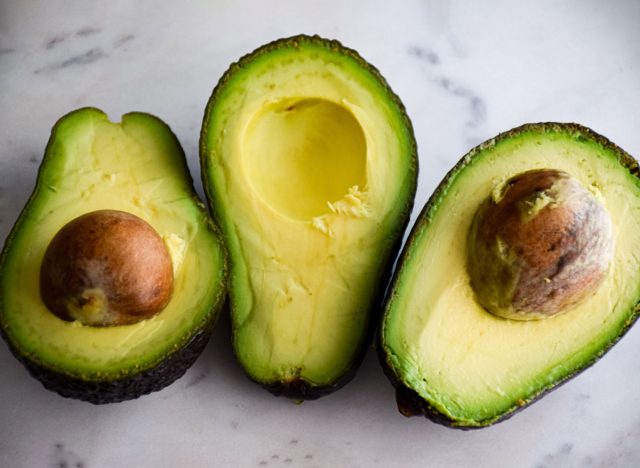
The majority of calories in avocados come from fat, and this nutrient profile allows avocados to benefit the skin. Higher intake of total fat and unsaturated fat, like that found in avocado, are associated with improved skin elasticity, according to a study. This study also noted a higher intake of green and yellow vegetables is associated with a decreased wrinkle score. Avocados are a blend of both of these features and can require minimal prep before eating. An especially convenient source of avocado is WHOLLY AVOCADO. Made with only 100% avocado and nothing else, WHOLLY AVOCADO is ripe and always ready and makes enjoying avocado easy and hassle-free with no need for cutting or waiting on fussy avocados—perfect for adding to salads or smoothies. I love the Avocado Minis because they are perfectly portioned.
Tomato
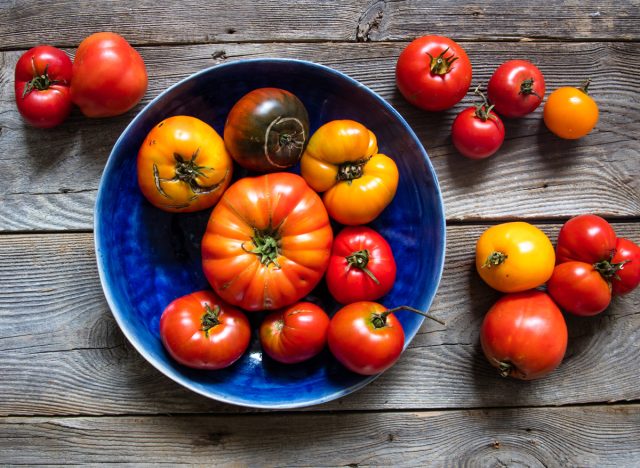
Tomatoes are a rich source of vitamin C, a nutrient with antioxidant effects that also aids in the production of collagen in your body. This protein can aid skin elasticity, leading to a more youthful look. Certain compounds in tomatoes, like lycopene, can also protect your skin from UV ray damage. Many fruits and veggies are packed with vitamin C making them good foods for your skin. For enjoyable ways to boost vitamin C intake, tomatoes can be drizzled with olive oil, combined in a salad with green and yellow veggies, or made into a gazpacho soup.
Green tea
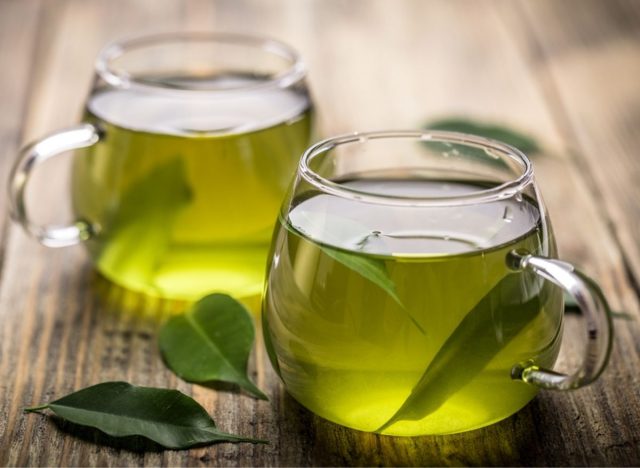
As hydration is an important part of your skin health, other liquids besides water may help boost hydration and provide added skin benefits. Green tea is known for its high antioxidant content, and this allows it to also protect your skin from the sun. Another study also found green tea consumption improved skin elasticity, texture, and hydration. Enjoy green tea as part of your daily hydration, and consider adding a squeeze of lemon for a boost of vitamin C. Just avoid adding sugar to your drink as it can actually have a negative impact on your skin.
Bell pepper
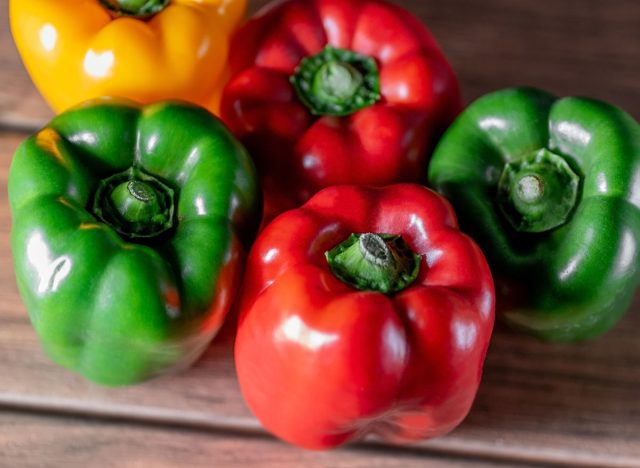
With color varieties in green, yellow, orange, and red, bell pepper is another food high in vitamin C. A previously mentioned study noted the skin benefits of green and yellow vegetables, which could include bell peppers. Another study showed women with a higher intake of vitamin C had a lower likelihood of wrinkling. One cup of chopped green bell pepper provides 120 milligrams of vitamin C, an amount that meets the daily recommended intake for adults. Enjoy raw bell peppers with dips, add them to your salad, or incorporate them into your favorite savory dishes for added crunch and vitamin C.
Kiwi
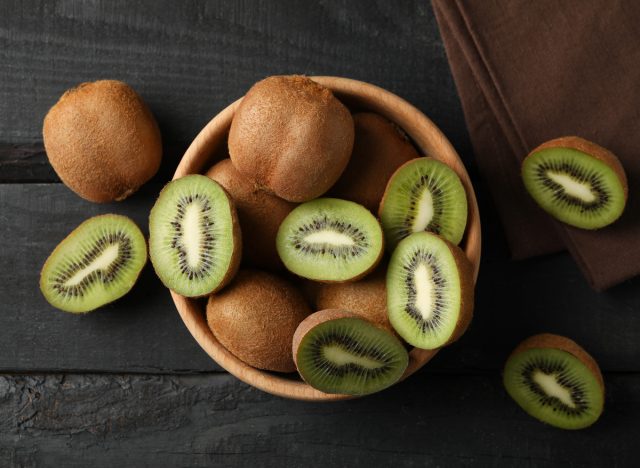
Kiwifruit is yet another food packed with vitamin C. Not only does one fruit provide 64 milligrams of this vitamin, but it also contains vitamin E. This vitamin promotes skin integrity by protecting your epidermis from damaging UV rays and oxidative stress. Kiwi also contains antioxidants that can further protect skin cells. Kiwi is known for its bright green flesh and black seeds and is most often enjoyed in fruit salads or on its own. Blend into smoothies or top a parfait for other incorporations into daily eating habits.
Broccoli
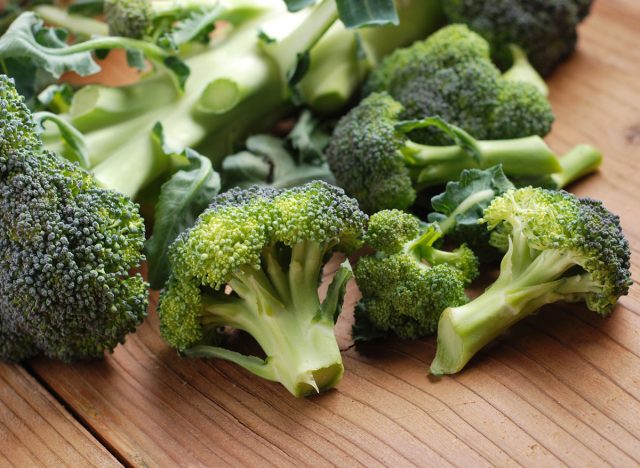
Similar to other green vegetables, broccoli also appears to be beneficial to the skin. This is largely due to its zinc and vitamin C content, and the presence of lutein. This pigment is a type of carotenoid that is responsible for the yellow, red, and orange colors in produce. Lutein also appears to protect the skin damage induced by UV rays. Broccoli can be enjoyed raw or cooked; however, cooking produce at high heat can destroy vitamin C. Other foods high in lutein include spinach, bell peppers, and carrots.
Eggs
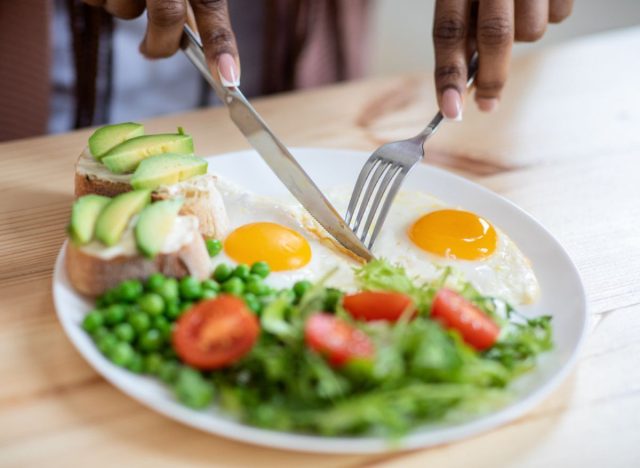
A source of essential nutrients protein and fats, eggs are also a source of skin-protecting lutein.
In addition to containing lutein, the protein in eggs helps to promote skin integrity. In fact, one study noted that protein-energy deficiency can cause wasting of the dermis and reductions in collagen density. Additionally, previously mentioned research noted total fat intake could positively benefit skin elasticity. As a convenient source of protein, fat, and lutein, eggs can be incorporated into your daily diet to promote skin health. Fried, boiled, scrambled, or poached, eggs can be enjoyed in a variety of ways and easily paired with other skin-promoting foods.
Olive oil
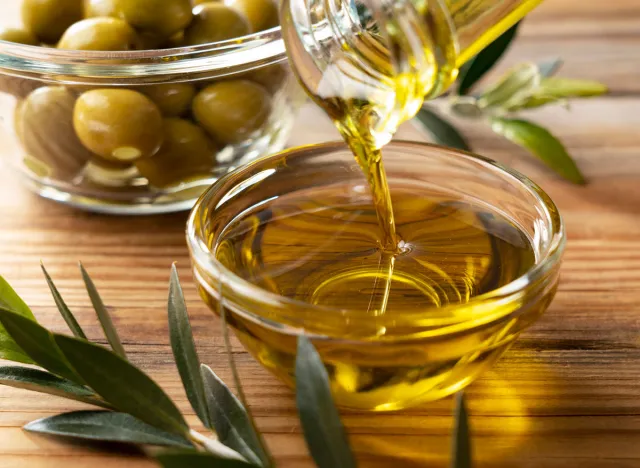
An ingredient that can be incorporated into sweet and savory dishes, olive oil is another food packed with healthy fats. One tablespoon of this oil packs about 14 grams of fat, most of which are from unsaturated sources. Olive oil also contains vitamin E protects the skin from UV rays and can enhance the absorption of carotenoids, another skin-benefiting nutrient. Carotenoids are in several foods on this list, including orange bell pepper, tomato, and broccoli, and can also be found in kale, spinach, and carrots. Preparing these vegetables with olive oil may allow you to get more skin-benefitting effects out of your produce. When choosing olive oil, Terra Delyssa is an amazing option that uses olives grown without any chemicals or pesticides. They even have a unique traceability feature that allows you to track the olives from the orchard to the filling of the dark glass bottle.
Strawberries
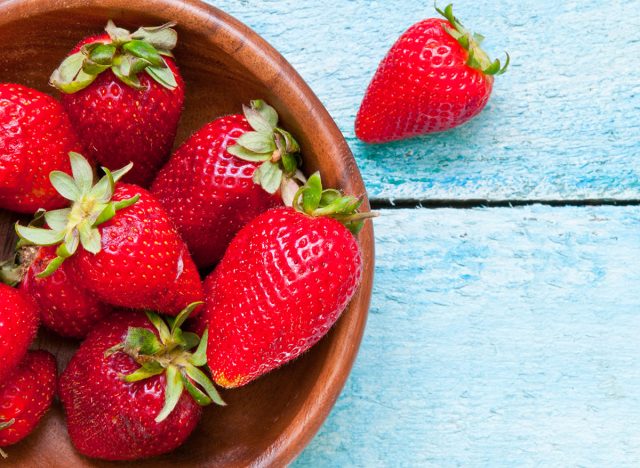
This berry is a source of antioxidants and vitamin C. This enables strawberries to benefit the skin, and research also suggests these anti-inflammatory properties that could treat acne. When consumed, vitamin C can serve anti-inflammatory functions within the body, including skin issues, and this vitamin can also be applied topically to further aid the skin. As part of a vitamin C-rich diet, include strawberries and other fruits throughout the day. Incorporate into snacks and meals, or swap your typical sugar-sweetened desserts for this fruit with natural sweetness.
Bone broth
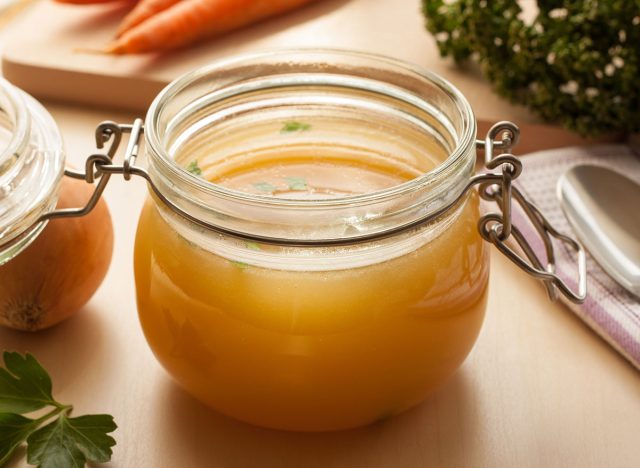
A source of important nutrients, protein, and collagen, bone broth can benefit the skin in a variety of ways. Protein appears to reduce wasting of the dermis and collagen consumption can reduce and delay skin aging. A tasty way to eat more collagen is by sipping on bone broth. Azuluna Pasture-Raised Chicken Bone Broth packs 14 grams of protein and 8 grams of collagen. Not only is this great for your skin, but Azuluna only uses pasture-raised chickens and regenerative farming practices which makes their bone broth better for the people and the planet. Enjoy on its own for a simple snack, or use in broth-based dishes for a nutrient boost.
Sunflower seeds
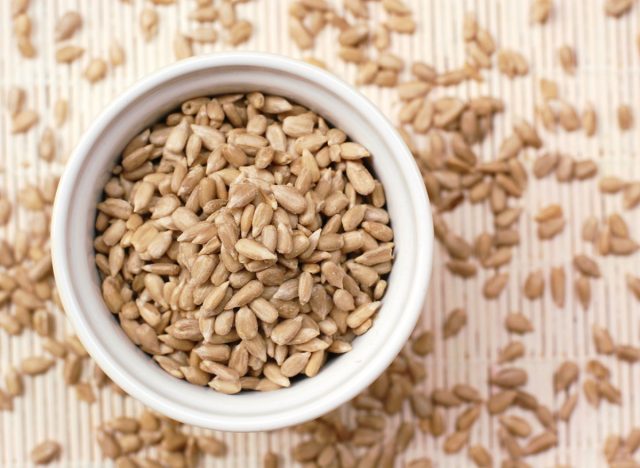
Many nuts and seeds contain nutrients that benefit the skin. In the case of sunflower seeds, they pack vitamin E, zinc, fat, and protein, all of which aid skin appearance and health. Dietary protein is important in repairing skin tissue and is essential to the skin renewal cycle, which is 28 days. As a convenient source of protein and other nutrients that benefit the skin, sunflower seeds earn a place on this list. Additionally, sunflower seeds can be an alternative to nuts for those who have sensitivities and allergies. Incorporate sunflower seeds into trail mix, add to your oatmeal or salad, or even incorporate into baked goods as a crunchy topping on muffins and breads.
Cherries
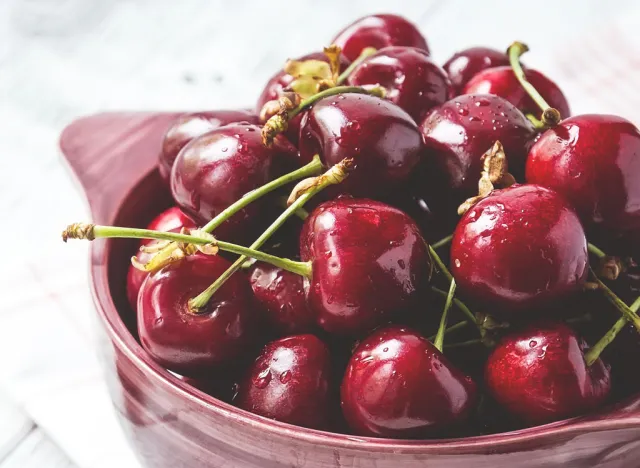
This small, bright red fruit is another concentrated source of antioxidants. This makes cherries a beneficial food for skin health and for whole body wellness. Cherries contain vitamins C, E, and A, all of which have antioxidant properties. Tart cherries, in particular, have a high concentration of melatonin which has sleep-regulating properties. Eating cherries and drinking cherry juice can help promote improved sleep which can further aid skin. In fact, chronic poor sleep appears to be associated with diminished skin barrier function. With multifaceted benefits on skin health, add whole cherries to meals or snacks, or add cherry juice (no added sugar) to your favorite smoothie loaded with other skin-benefiting ingredients.
- Source: https://onlinelibrary.wiley.com/doi/full/10.1111/j.1600-0625.2009.00924.x
- Source: https://pubmed.ncbi.nlm.nih.gov/29392767/
- Source: https://www.ncbi.nlm.nih.gov/pmc/articles/PMC4529263/
- Source: https://www.ncbi.nlm.nih.gov/pmc/articles/PMC3257651/
- Source: https://pubmed.ncbi.nlm.nih.gov/25108414/
- Source: https://www.ncbi.nlm.nih.gov/pmc/articles/PMC4169675/
- Source: https://pubmed.ncbi.nlm.nih.gov/20085665/
- Source: https://pubmed.ncbi.nlm.nih.gov/16465309/
- Source: https://pubmed.ncbi.nlm.nih.gov/11351267/
- Source: https://pubmed.ncbi.nlm.nih.gov/21525260/
- Source: https://pubmed.ncbi.nlm.nih.gov/20620757/
- Source: https://pubmed.ncbi.nlm.nih.gov/17921406/
- Source: https://ods.od.nih.gov/factsheets/VitaminC-HealthProfessional/#h2
- Source: https://fdc.nal.usda.gov/fdc-app.html#/food-details/168153/nutrients
- Source: https://pubmed.ncbi.nlm.nih.gov/29411317/
- Source: https://pubmed.ncbi.nlm.nih.gov/19168000/
- Source: https://www.ncbi.nlm.nih.gov/pmc/articles/PMC5104383/
- Source: https://fdc.nal.usda.gov/fdc-app.html#/food-details/171413/nutrients
- Source: https://pubmed.ncbi.nlm.nih.gov/15277161/
- Source: https://pubmed.ncbi.nlm.nih.gov/19134126/
- Source: https://www.ncbi.nlm.nih.gov/pmc/articles/PMC8824545/
- Source: https://www.ncbi.nlm.nih.gov/pmc/articles/PMC7146365/
- Source: https://www.ncbi.nlm.nih.gov/pmc/articles/PMC3133468/
- Source: https://pubmed.ncbi.nlm.nih.gov/25266053/









